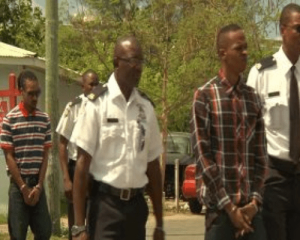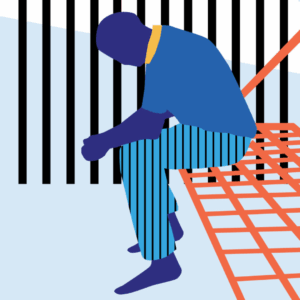
Photo credit: Cayman News Service
Cayman News Service: UK court rules against closed-door legal hearing
- DPP in the Media
- 4 Mar 2023
This article was originally published in local media outlet Cayman News Service, 3 March 2023.

(CNS): Two Caymanian prisoners serving life sentences for murder have won an important legal victory in a fight to serve their sentences at HMP Northward after being transferred without notice to high-security prisons in the UK. The Judicial Committee of the UK’s Privy Council (JCPC), after a historic sitting in the Cayman Islands, has ruled that the case must go back to the Grand Court as the courts here have no authority to hold a closed-door hearing that excluded brothers, Justin Ramoon and Osbourne Douglas, preventing them from challenging the reasons for their enforced transfer.
Lawyers representing the brothers in this complex case have been battling for some six years to secure a fair hearing about their transfer to Britain, where they have no ties and have been separated from their families here in the Cayman Islands, including their children. Although they began serving their time in Britain in the same prison, they have since been separated and are in jails hundreds of miles apart.
Throughout the case, the Cayman authorities have refused to share with the brothers or their attorneys the details of the intelligence that they claim supported the decision for them to be moved.
They have broadly stated that they have information that the men remain criminally active from behind bars as members of a gang, directing murders and gun smuggling, as well as planning an escape. But the authorities have consistently refused to disclose the relevant evidence supporting the allegations, claiming that it would undermine national security to do so, thereby preventing their lawyers from refuting it.
This important ruling by the JCPC, which is the highest appeal court for the UK territories, makes it clear that the Cayman Islands Government authorities cannot hold such Closed Material Procedures (CMPs), the definition of the hearing that was adopted in this case. The finding paves the way for the brothers’ judicial review of the transfer to be reheard after the lawyers successfully argued that there was no legal basis in the Cayman Islands for the courts to hold a CMP, making the resulting proceedings inherently unfair.
Explaining their support for the brother’s argument on that point, the JCPC summed up the position. “It is simply not open to [the courts] to invent a CMP for the Cayman Islands under the guise of the development of the common law,” the committee stated in its ruling. “This would be considerably more than an incremental development; it would be a major change involving an inroad into fundamental common law rights.”
The judges explained that due to the inherent unfairness of CMPs to individuals, parliament is better placed to “assess the policy considerations relating to the necessity for such a procedure… and to make detailed procedural rules to regulate the procedure”.
Dismissing the CIG’s request to strike out the claim, the JCPC held that the claim should now proceed to trial solely on the basis of the material that the respondents (the governor of the Cayman Islands and the director of prisons) are willing to disclose.
Local defence attorney Prathna Bodden of Samson Law, who represents Ramoon and who has spearheaded the fight for a fair hearing, said it was a significant development in his long-running challenge to his transfer to the UK. “We welcome the Privy Council’s ruling that the government cannot hold secret hearings without express authority,” she said. “This is a victory for open justice and fairness in the courts of the Cayman Islands.”
Saul Lehrfreund from the Death Penalty Project, an organisation that partnered with Samson Law in this case, added that this decision would create a fairer and more transparent justice system. “The Privy Council’s ruling that CMPs cannot take place without proper guidelines and defined procedure upholds important fair trial rights. Excluding individuals from trials should only ever be a last resort,” he said.
The organisation provides free legal representation and assistance not just to those facing the death penalty but other vulnerable prisoners and seeks to improve the law by creating lasting legal precedents.
Ramoon and his brother were convicted of killing Jason Powery in a gang-related shooting outside a George Town bar in 2015 after a judge-alone trial presided over by the late Justice Charles Quin. They were sentenced to more than 30 years in jail. But in 2017, just months into their sentences, the brothers were shipped, without notice and in weeks of each other, to a UK jail. In those six years they have been allowed one visit from family members after the CIG financed a trip in 2019.
While the brothers are now expected to get a new hearing, it does not mean that thier application to return to the Cayman Islands will succeed but they will be given a fair chance to argue their case.
They are not the only prisoners that were transferred under the 19th century law. Elmer Wright (26), who is serving a minimum sentence of 21 years in connection with a violent home invasion, was transferred to the UK in 2020. Wright is also considered a high-risk prisoner, but so far, he has not challenged his transfer from Cayman.

















